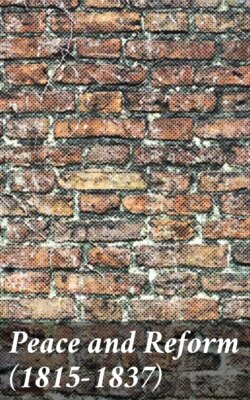Читать книгу Peace and Reform (1815-1837) - Группа авторов - Страница 7
На сайте Литреса книга снята с продажи.
THE HOLY ALLIANCE (1816).
ОглавлениеTable of Contents
Source.—Annual Register, 1816.
The hon. member rose to move for the production of a copy of the treaty concluded at Paris on September 26th between Austria, Russia, and Prussia. By the tenor of this treaty, expressed in the most devout and solemn language, the three potentates, members of three different Christian churches, declared in the face of the world their resolution both in the administration of their own states, and in their political relations with other Governments, to take for their sole guide the precepts of the holy religion taught by our Saviour. In consequence, they signed an agreement to three articles, the first of which bound them to a fraternity of mutual friendship and assistance, and the common protection of religion, peace and justice, which in the second was explained in a kind of mystical strain, to notify that they regarded themselves as delegated by Providence to govern three branches of one and the same Christian nation, of which the Divine Being under his three characters was the sole real sovereign; and the third declared a readiness to receive into this holy alliance all the powers who should solemnly avow the sacred principles which had dictated it.
Politicians were much at a loss to conceive the occasion and purpose of a treaty, at the same time so serious and so indefinite, which appeared to bind the subscribers to nothing more than to act upon those general principles which, as Christian princes, they had always held forth as the rule of their conduct. It was understood that its immediate cause was an impression made upon the mind of the emperor Alexander, whose peculiar zeal in the project was displayed by a manifesto issued on Christmas day, and signed by his own hand, in which he made public the engagement which the three powers had entered into, and which he interpreted to be a reciprocal league of peace and amity upon Christian principles for the general good.
Mr. Brougham prefaced his motion with reasons why he thought it material that inquiry should be made respecting the above treaty, instancing the circumstances of its having been contracted by three powers, our allies, without our participation; of its having received the signatures of the sovereigns themselves, whereas all other treaties had been ratified by the medium of diplomatic agents; of being apparently uncalled for, since the attachment of the contracting parties to the Christian religion had never been questioned. He adverted to the union of the same powers for the partition of Poland, on which occasion the empress Catherine had employed in the proclamations language similar to that of the treaty.
He concluded by moving an address to the Prince Regent, that he would be pleased to give directions that a copy of the treaty would be laid before the House.
Lord Castlereagh who had previously admitted to the authenticity of the document moved for, after adducing, from the result of the preceding union of these sovereigns, arguments against regarding them with suspicion, informed the hon. gentlemen, that instead of any secrecy in their proceedings on the present occasion, the emperor of Russia had communicated to him a draft of the proposed treaty, he believed, before it had been communicated to the other sovereigns; and that after its signature a joint-letter had been addressed by them to the Prince Regent, stating the grounds on which it had been concluded, and anxiously desiring his accession to it: that his Royal Highness in reply had expressed his satisfaction at the nature of the treaty, and his assurance that the British Government would not be the one least disposed to act up to its principles. His lordship then went into a panegyric of the emperor of Russia, and finally characterised the motion as wholly unnecessary and of dangerous tendency if the confederacy could be shaken by attempts to degrade the sovereigns of Europe by unfounded imputations.
On a division of the House, the motion was rejected by a majority of 104 to 30.
The public opinion concerning this extraordinary treaty seems to have corresponded with that expressed by the hon. Mr. Bennet in his speech: "that the only motive which the noble lord could have for refusing its production was, that he was ashamed of it and of our allies."
